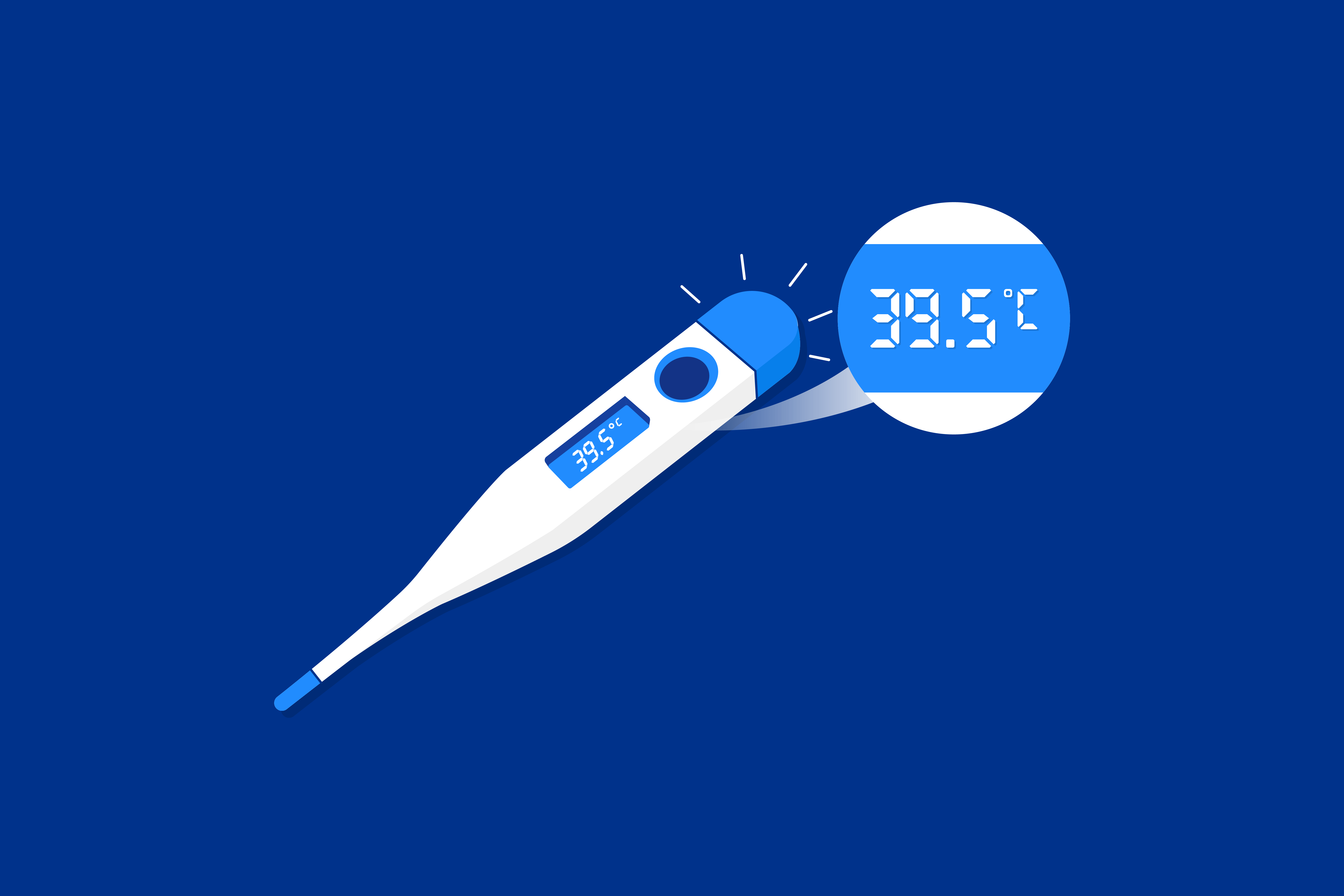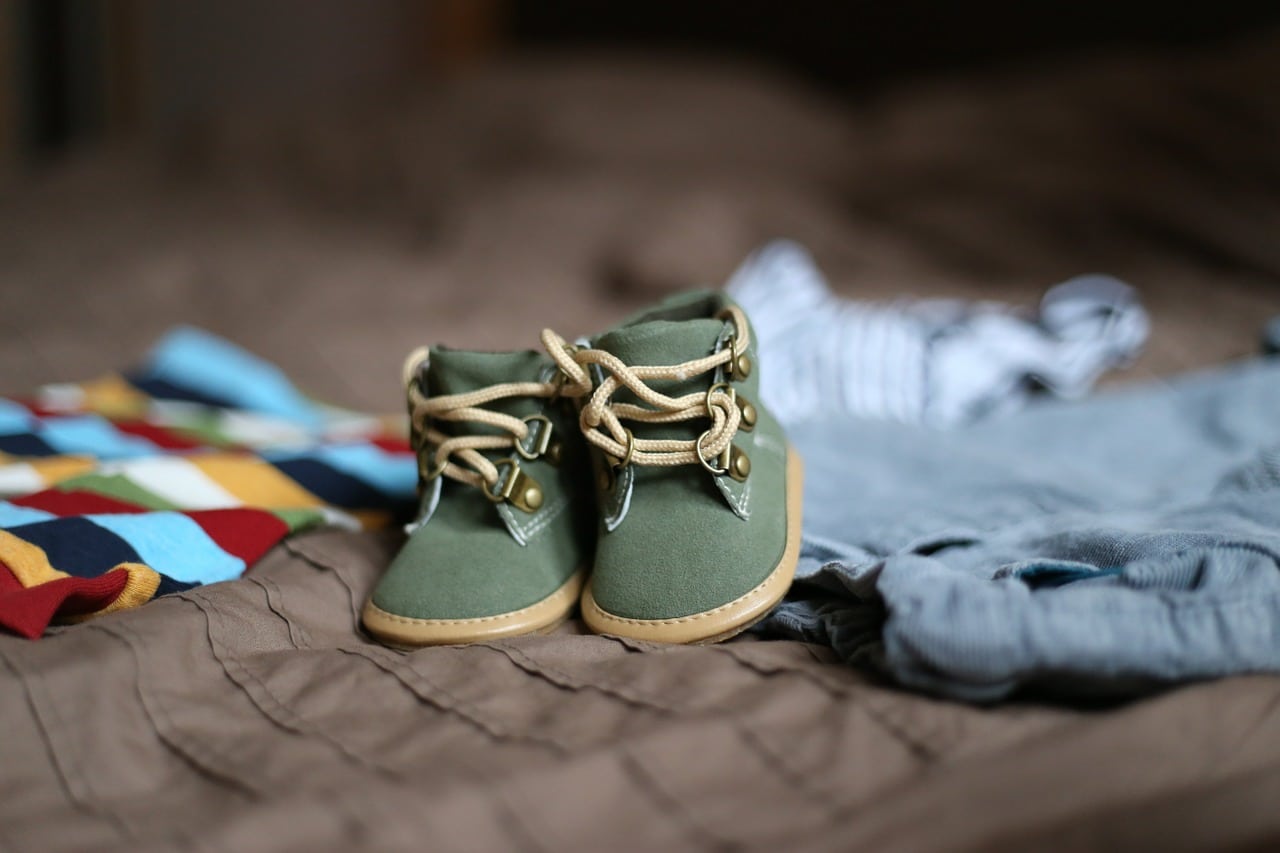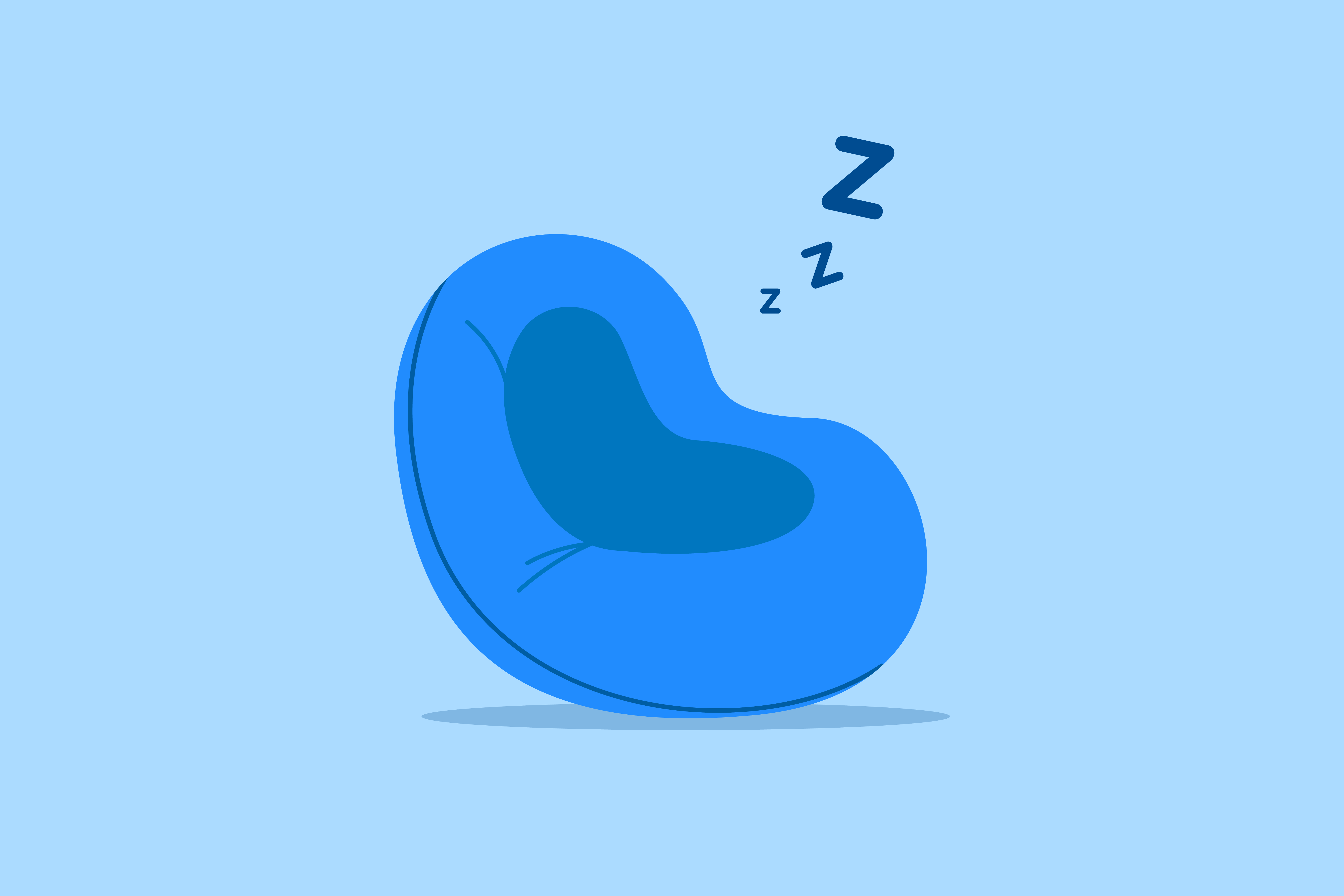Key Takeaways
Do you ever find yourself tossing and turning at night, feeling too hot to get comfortable? You’re not alone! Many of us struggle with this issue, and there are a variety of potential causes.
The natural decline of Core Body Temperature around bedtime facilitates sleep onset (reduces sleep onset latency) and temperature throughout sleep is associated with sleep stage (cooler temperature = more slow wave sleep/deep sleep) is called thermoregulation.
Thermoregulation is a balance between the core (heat generation due to activity of internal organs) and skin, which facilitates heat dissipation through blood flow.
In this article, we’ll explore why you get so hot when you sleep and what you can do to cool down a room. Let’s look at the importance of temperature regulation for good sleep, how thick bedding and pajamas can affect body temperature, and how to reduce stress and anxiety.
Causes of Feeling Hot When Sleeping
You may feel hot when sleeping due to various factors, including hormones, environmental conditions, and medications. This can lead to uncomfortable nights, making falling asleep and maintaining a good night’s sleep difficult. Even sleeping with long hair can leave you feeling hot, as it can trap heat near your neck and shoulders.
In some cases, hot flashes and sweating at night can occur due to hormonal imbalances, such as during pregnancy, menopause, or other times of life transition. Increased core body temperature and body heat can also be caused by exercising too close to bedtime, consuming caffeine late in the day, and stress/anxiety.
Environmental conditions are also a contributing factor to sleeping hot. These include a warm bedroom, wearing socks to bed, thick bedding and pajamas, and high humidity. It’s recommended to keep the room temperature between 65-70°F and opt for breathable, lightweight materials for bedding and sleepwear. Investing in a cooling mattress for hot sleepers can prevent heat retention and increase air circulation.
Finally, certain medications can also contribute to feeling hot at night sweats. These include antidepressants, ADHD medications, and hormone-disrupting drugs, which can cause increased body temperature and causes night sweats. If you experience night sweats, it’s important to consult a healthcare provider to rule out any underlying health concerns.
Feeling hot when sleeping can indicate an underlying medical condition, so consult a healthcare provider if the sleep hot issue persists. In the meantime, many strategies can help prevent sleeping hot, such as creating a cool sleep environment, practicing good sleep hygiene habits, and managing stress and anxiety. Following these tips can improve your sleep quality and achieve a comfortable night’s rest.
Ways to Cool Down at Night
You can cool down at night by sleeping with a fan on or air conditioning, taking a warm shower before bed, avoiding triggers like caffeine 10-12 hours before bedtime or other hot drinks shortly before bed, and consulting a healthcare provider if the issue persists.
The best temperature for sleep is around 60-67°F. This will help ensure that your skin temperature is at the right level. Any hotter and your skin temperature and core temperatures will be too high, which can trap heat and lead to higher core body temperature. This will result in a decrease in slow-wave sleep. Air conditioning can help keep the bedroom temperature optimal so you can get a restful sleep.
Thick bedding and sleepwear can also trap heat and contribute to feeling hot when sleeping. Choosing breathable materials like cotton, linen, or bamboo is best. Memory foam mattresses can retain more heat than spring mattresses, so it’s important to check the material of your mattress.
Exercise close to bedtime can also increase core body temperature again, so avoiding vigorous physical activity within an hour of sleep is best. A caffeine kick increases core body temperature, so avoiding drinking too much caffeine or consuming it late in the day is best, particularly as you’re getting older.
“Although there is genetic diversity, caffeine typically has a half-life of 6–7 hours. Consequently, refraining from caffeine intake beyond midday can enhance the chances of achieving desired sleep”, Dr. Renske Lok adds.
Anxiety, stress and insomnia can also contribute to feeling hot when sleeping. It’s important to manage stress and anxiety before bedtime. If sleep issues persist, seek professional help. It’s also important to consult a healthcare provider if hot sleeping persists, as excessive sweating can indicate an underlying health issue.
Temperature and Sleep Quality
Maintaining an optimal temperature in your bedroom is essential for improving sleep quality. During sleep, your core body temperature drops, allowing your body to enter more deep sleep. It’s important to create a cool environment for your bedroom to ensure your body can regulate its temperature. A higher core body temperature can interfere with your body’s ability to enter deep sleep, leading to poor sleep quality.
When melatonin is produced, core body temperature drops. This primes the body for sleep. In this narrative, it is predominantly important to keep room lighting low, so melatonin for sleep can be produced and core body temperature can start to drop,
so it’s important to maintain a cool temperature for your bedroom. This can be achieved by setting your thermostat to 60-67 degrees Fahrenheit and investing in breathable bedding materials such as cotton, linen, or bamboo. Additionally, using a fan or dehumidifier to increase air circulation can help to stay cool in the bedroom.
Avoiding certain activities that can increase your core body temperature is also important. How caffeine works is consumption late in the day can disrupt your sleep environment. Exercising too close to bedtime can also raise your body temperature and interfere with your ability to sleep. It’s best to avoid vigorous physical activity within an hour of your sleep onset.
Stress and anxiety can also raise your body temperature, so managing stress and practicing good sleep hygiene tips is important. If night sweats persist, it’s important to consult your healthcare provider, as it may indicate an underlying health condition.
Solutions for a Hot Bedroom
To keep your bedroom cool, try setting the thermostat between 60-67°F and investing in breathable bedding materials. This will help you stay comfortable during hot weather and prevent your body from getting too hot. Some people even stick one foot out of the blanket to help sleep.
Skin temperature reveals much about your sleep quality and can indicate obstructive sleep apnea. It’s important to avoid intense exercise within an hour of sleeping and limit caffeine intake to prevent hot flashes and night sweats.
Here are some other tips to help you sleep cooler:
Tips to Help You Sleep Cooler:
- Cool Down Your Bedroom: Use a ceiling fan or air conditioner to keep your bedroom cool. Consider investing in a memory foam mattress that provides better airflow.
- Keep Curtains and Blinds Closed: Keep them closed during the day to block out the sun’s heat. You can open them during the evening if the outside temperature drops.
- Cross Ventilation: If you have multiple windows in your bedroom, try to create cross-ventilation by opening windows on opposite sides of the room. This can help promote better airflow.
- Choose Breathable Materials: Opt for lighter bedding materials like cotton, bamboo or linen sheets for better air circulation.
- Manage Stress and Anxiety: Stress and anxiety can raise body temperature and interfere with sleep. Practice relaxation techniques, including mindfulness, Verified Source ScienceDirect One of the largest hubs for research studies and has published over 12 million different trusted resources. View source before bed and talk to your doctor if you have trouble sleeping.
Effects of Thick Bedding and Pajamas
Unsurprisingly, wearing thick pajamas and using thick bedding can contribute to feeling hot while sleeping. Thick fabric traps heat and prevents the body from cooling (Especially with hands and feet covered), leading to excessive sweating and elevated body temperatures. This can further disrupt sleep, making it difficult to reach and maintain both REM sleep (Find out what REM stands for here) and Slow Wave Sleep (SWS).
To regulate temperature and fall asleep, the body needs to cool down before sleep, and the perfect sleep temperature should be around 60-67°F.
The body cannot do this when thick bedding and sleepwear are used. As a result, the body is unable to regulate temperature, and the body temperature remains high. This can lead to disturbed sleep patterns and acute stress. Furthermore, certain medications may cause the body’s ability to retain more heat than usual, leading to even higher body temperatures.
To get uninterrupted sleep and regulate elevated body temperature as well, it’s recommended to use breathable fabrics and materials for bedding and sleepwear and keep hands and feet outside bedding. Linen, cotton and bamboo sheets are great options, as they allow airflow and prevent heat from being trapped against the body. Additionally, it’s important to maintain the bedroom temperature at an optimal level and avoid activities that increase body temperature, such as exercising or consuming caffeine close to bedtime.
Impact of Exercising Close to Bedtime
Exercising close to bedtime can significantly raise your body temperature and cause a potential phase shift in the circadian rhythm in your sleep. It’s important to understand the impact of exercising close to bedtime on your sleep and body temperature. Making a few adjustments to your pre-sleep routine can help you fall asleep faster and improve the quality of your sleep.
Before bed
- Avoid eating a big meal close to bedtime as it can cause low blood sugar
- Avoid consuming caffeine 10-12 hours before bedtime
- Refrain from vigorous exercise close to bedtime as it can raise body temperature
- Drink a warm, non caffeinated beverage such as warm milk.
- Allow yourself time to wind down and relax
- Avoid overstimulating activities like watching television or using your phone
- Use a cooling mattress, and low thread count bedding to improve sleep quality
- Make sure to get enough recovery sleep to help your body recover and rejuvenate
At bedtime
- Use sleep sounds to relax and destress before bed
- Make sure you have an optimal sleep environment with the right combined temperature and humidity
- Consider your personal preference for pre-sleep activities such as reading or listening to music
Influence of Caffeine on Body Temperature
Frequently consuming caffeine can drastically raise your body temperature. Verified Source National Library of Medicine (NIH) World’s largest medical library, making biomedical data and information more accessible. View source This is especially true if you drink caffeine late in the day or within an hour of going to bed. Caffeine can increase your body temperature, making it harder to fall asleep at night in a warm room. It can also disrupt your sleep stages, causing you to experience poor sleep. If you suffer from sleep apnea, consuming caffeine can make it even more difficult to find relief.
Caffeine isn’t the only factor that can raise your body temperature. Hormone therapy medications, diabetes medications, antidepressants, and other drugs can also lead to higher body temperatures. Verified Source National Library of Medicine (NIH) World’s largest medical library, making biomedical data and information more accessible. View source Due to their different heat-retaining properties, you may feel too hot at night or during sleep.
If you’re consistently feeling hot when you sleep, consider taking a warm shower or bath before bed and avoiding night sweat triggers like caffeine. You can also consult a healthcare provider if this issue persists. Practicing good sleep hygiene and managing your stress and anxiety can also help you spur healthy sleeping habits and achieve a cooler temperature and better sleep overall.
Stress and Anxiety’s Relationship to Body Temperature
Surprisingly, stress and anxiety can significantly raise your body temperature, making sleeping difficult. From underlying medical conditions to hormonal changes, there are several reasons why you get so hot when you sleep. Here are some of the most common causes of sleeping hot for sleepers:
- Medical Conditions: Hyperthyroidism, excessive sweating, intolerance to heat, and sleep problems can all increase body temperature, making it difficult to sleep.
- Medications: Certain medications, such as antidepressants, ADHD, and hormone-disrupting medications, can cause hot flashes and sweating at night.
- Hormonal Changes: Pregnancy, postpartum, Verified Source Cleveland Clinic Ranked #2 hospital by U.S. News & World Report and one of the largest academic medical centers in America. The Cleveland Clinic serves patients from all over the world. View source and menopause can all lead to hot flashes, night sweats, and increased body temperature.
- Body Weight: Heavier individuals generally have higher body temperatures Verified Source National Library of Medicine (NIH) World’s largest medical library, making biomedical data and information more accessible. View source and can be more prone to hot sleeping.
- Sleep Deprivation: Insufficient sleep can raise your average temperature and make sleeping difficult.
Fortunately, there are some steps you can take to improve your sleep quality. Taking a warm shower or bath before bed, using a fan or air conditioning to cool the bedroom, and choosing breathable bedding and sleepwear can all help to cool down at a good night’s sleep.
Also, managing stress and anxiety, practicing good sleep hygiene habits, and consulting a healthcare provider if hot sleeping persists can help you achieve better sleep.
Frequently Asked Questions
What causes you to get really hot while sleeping?
Hot flashes, warm bedding or clothing, especially socks or other clothing covering the extremities, certain drugs, or an underlying medical condition can all contribute to nighttime overheating in some situations. The average person’s body temperature is relatively constant during the day but dips at night Verified Source National Library of Medicine (NIH) World’s largest medical library, making biomedical data and information more accessible. View source Because there is a circadian component, it dips during the night but slightly increases during the day, peaking right before bedtime
How do I stop getting hot at night?
Take a warm bath or shower before bed, consider using a fan to cool down your bedroom (target for a temperature of 60 to 67 degrees Fahrenheit), and stay away from substances that can cause night sweats, such as caffeine. Contact your healthcare practitioner if you continue to feel uncomfortably warm at night.
Do our bodies get warmer when we sleep?
The body’s core temperature peaks two hours before bedtime and subsequently drops, resulting in an increase in skin temperature. This may cause some people to feel heated at night. The body releases heat to cool itself through vasodilation, which means dilated blood vessels. This primarly happens in the extremities of the body, such as hand and feet.
“This is why it is almost impossible to fall asleep with cold feet. If your extremities are too cold, there will be vasoconstriction of blood vessels, resulting in heat conservation. Falling asleep is associated with a sudden drop in Core Body Temperature, which won’t happen under these circumstances”, says Dr. Renske Lok.
Why is my boyfriend so hot in bed?
High metabolism individuals convert energy into heat. The process is known as thermogenesis, Verified Source ScienceDirect One of the largest hubs for research studies and has published over 12 million different trusted resources. View source and “hot” people radiate more as a result of the necessity to do so to maintain a steady body temperature. More or excessive body heat can escape when blood vessels close to the skin dilate.
Conclusion
If you’re having trouble sleeping due to feeling too hot, it’s important to figure out the cause. From temperature to bedding to exercise, many factors can cause you to overheat at night.
Taking steps to cool down, like keeping your bedroom temperature low and wearing lighter clothing, can help you sleep better. It’s also important to manage stress and anxiety to ensure your body temperature stays regulated.
With the right strategies, you can understand why you’re feeling too hot and start getting the restful sleep you need.
About the author
Eric Ridenour is a health and wellness writer with a strong focus on sleep and nutrition. With a background in health science and psychology, Eric has a deep understanding of the connection between sleep and overall well-being. His expertise has been sought by various businesses and individuals, and his work has been featured in reputable publications such as Thrive Global, Drug Report, and Authority Magazine. Eric's commitment to promoting better sleep and comprehensive wellness is evident in his writing and consultations. He is a published author working on his second book.
View all posts





